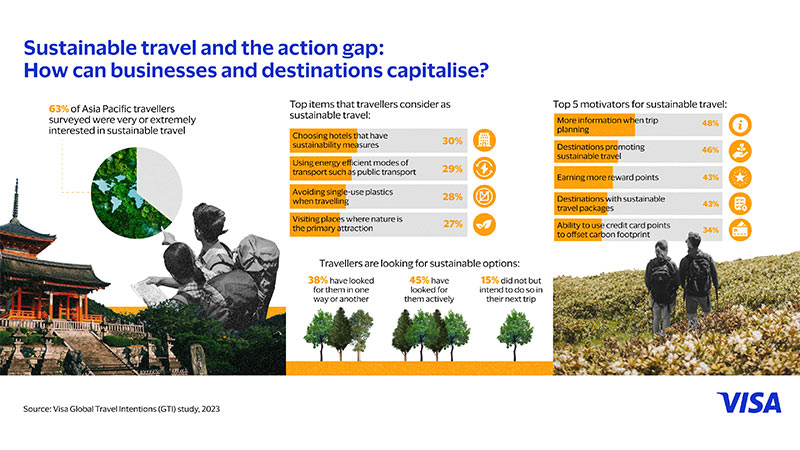Sustainable travel and the action gap: How can destinations capitalise?

Asia-Pacific travellers are on the move once again, which is great news for the travel and hospitality industries. At the same time, another momentous change is afoot. According to Visa’s newest Global Travel Intentions survey, the region's travellers are increasingly looking for sustainable travel, mirroring the growing global urgency to promote responsible tourism.
Eco-minded travel on the rise
According to Visa’s Global Travel Intentions survey, 63 percent of Asia-Pacific travellers were very or extremely interested in sustainable travel. Their increasingly ecologically minded travel mindsets shape where they travel, how they travel, and what they do at their destinations.
Asia Pacific travellers are also becoming more aware of what it means to travel sustainably. According to the survey, sustainable travel includes choosing hotels or accommodations with sustainability measures in place (30%), using energy-efficient modes of transportation such as public transit (29%), and visiting destinations where nature is the primary attraction (27%). In fact, only 14 percent of respondents said they do not have sufficient knowledge about eco travel or sustainable travel.
Sustainable travel is clearly becoming part of the consciousness of Asia Pacific travellers. The next challenge is for destinations and businesses to turn mindsets into action. Bridging this is a big step to cleaner travel and sustainable growth around the region and the world.
Travellers spurred by tangible information and rewards
Among factors motivating people to embrace sustainable travel, access to adequate information about travel options and attractive rewards for making the switch are key.
48 percent of the respondents said that having more information on how to travel more sustainably while planning trips was a motivator for them to travel sustainably. They were also encouraged by destinations that promoted sustainability initiatives (46%) and those offering travel packages that included sustainable choices in the itinerary (43%).
These resonate with additional findings that travellers are looking for sustainable options. According to the survey, 45 percent of respondents have actively looked for sustainable options and 38 percent have somewhat searched for these during their trip planning. 15 percent have not done so but intend to for their next trip.
These findings suggest businesses and destinations would do well to place sustainability-focused offerings front and centre on their websites and locations or launch marketing efforts to fill travellers’ knowledge gaps. Indeed, destinations such as New Zealand and Australia have long enhanced their appeal by integrating sustainability into their tourism campaigns and their local tourism industry supply chain.
These countries show how providing the information and tangible means of taking part in eco-conscious travel activities can entice travellers to do so. Local businesses can do their part by aligning with large-scale efforts, by connecting travellers with eco-friendly travel options in their area or by partnering with relevant vendors and sights.
Another key driver of sustainable travel in the Global Travel Intentions survey is earning rewards for choosing sustainable options. 43 percent of respondents said they considered a sustainable travel option because it earns them more reward points, while about a third (34%) say the ability to use credit card points to offset their carbon footprint motivates them to travel sustainably.
Removing barriers to sustainable travel
The Asia-Pacific travel and tourism ecosystem offers numerous opportunities to help achieve a net-zero future. As a global leader in digital payments, Visa has worked with many destinations and businesses around the world to encourage sustainable travel and to make sustainable travel options more accessible.
For instance, Visa is contributing to the groundswell in consumer demand for sustainable travel and rewards and connecting travellers to new ways to travel responsibly. The Visa Eco Benefits programme in Asia Pacific launched in January 2023 is a suite of sustainability-focused solutions that helps Visa cardholders across the region better understand the environmental impact of their day-to-day payments. Cardholders can calculate carbon footprint generated by their Visa transactions, and access options for carbon offsetting or charitable donations from their bank’s website or app. This addresses the central motivators of information and rewards that drive consumers to pursue sustainable travel options.
While sustainable travel is often seen as costly, studies have indicated that consumers are willing to pay more for sustainable food, activities, transport and accommodations. Case in point: 23 percent of respondents in the Global Travel Intentions survey cited that an add-on to airfare to offset carbon emissions with Sustainable Aviation Fuel (SAF) would encourage them to be more sustainable, despite being an addition to travel costs.
As the global travel industry continues to recover from the pandemic’s impact, sustainable travel is an avenue for long-term growth, creating new ways for businesses and destinations to diversify their offerings and attract new visitors.
The Visa Global Travel Intentions Study 2023 was conducted by 4SIGHT Research & Analytics in April to June 2023 and surveyed 15,467 respondents across Australia, Hong Kong, India, Indonesia, Japan, Mainland China, Malaysia, New Zealand, Philippines, Singapore, South Korea, Taiwan, Thailand and Vietnam. Spanning over a decade, the biennial GTI survey sheds light on travel and payment behaviours while capturing emerging trends in the travel landscape.
Contact Visa to access the full Global Travel Intentions report and unlock more insights on travel in Asia Pacific.